Full name: Isabelle Pangault
Role: Head Winemaker and Brand Ambassador, Les Vignobles Foncalieu
DOB: 03/01/1983
Birthplace: Blois (Loire valley)
Twitter Handle: @IsaPangault
Website: en.foncalieu.com
Fun Fact: “I am a pole dancer!”
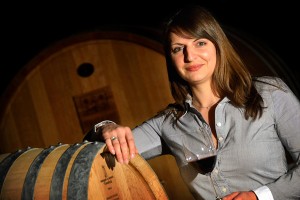
J: Hi Isabelle – ’tis an honour to be speaking with you! Thanks for taking the time.
I: My pleasure.
You’ve worked in some really interesting places. What was your time like at Sula Vineyards and with Baron Philippe de Rothschild?
Baron Philippe de Rothschild was my first winemaking experience, in 2006, so it definitely had some importance. It was really interesting because I discovered 2 different ways of working, 2 different worlds that coexist in the Bordeaux region: the regional Bordeaux AOC vineyard, in Entre-Deux-Mers, with grape selections going in the international Mouton Cadet brand, and the Grands Crus sphere, with Château Mouton-Rothschild.
At Sula Vineyards, in India, the idea was to live in a place where I would lose all my references and push my adaptation skills… and it worked! By that time, in 2008, the Indian wine industry was 10 years old, so all the defective wines had disappeared, but the styles were a bit ‘caricatural’ (a very herbaceous sauvignon, a very tropical viognier, a very oaky syrah…).
It was well adapted to educate new consumers’ palate, but maybe not elegant enough for a European one. Most of all, it was really mind opening!
Leading from above – you once said that the ‘mosaic of terroirs’ this provides allows you the opportunity to create lots of different styles of wine. Could you outline & elaborate on that a little for us?
You’re absolutely right. Languedoc-Roussillon is the largest wine region in the world (more than 200 000 ha) and the first wine producing region in France. With such a large area, it offers a plethora of terroirs (many different soils, climates, sun exposures…) that are really interesting when it comes to making blends.
For example, at Les Vignobles Foncalieu, our 2 main wineries are situated 50 km from each other: in Ensérune, West of Béziers, we benefit from a sunny and warm Mediterranean climate with strong sea influence, that results in ripe and rich wines, whereas in Puichéric, in the Minervois area, West of Languedoc, the average temperature is lower, with more oceanic influence, giving more crispy and fresh wines.
Playing with these different profiles helps us obtaining more complex blends, consistent from one year to another.
A few years back, you acquired Chateau Haut Gléon (which must have been exciting!) what have you been doing with the place?
We were looking for a place in Languedoc where we could produce super premium wines and that would also be a jewel where we could welcome our customers and the press, a reflection of our work philosophy.
That’s why we acquired Chateau Haut-Gléon three years ago.
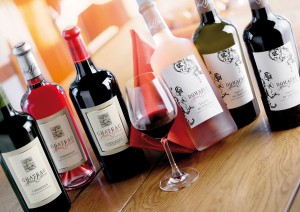
The first action was to renovate the rooms of the 13th century castle, so as to offer luxury bed and breakfast in this peaceful paradise overlooking the vineyard. At the same time, we undertook a big restructuring of the vineyard to adapt it to our ambitions. We replaced old vines that were not productive anymore and planted other varieties to get some more diversity in the blends, such as vermentino, viognier or grenache gris.
We also worked on the profiles of the wines, trying to obtain a better freshness and drinkability, to be more ‘modern’ in a way. The ageing process was a key to achieve that; we worked with new coopers for the barrels dedicated to the whites, enhancing their tension and minerality.
We also found that the use of bigger oak containers would respect better the original fruitiness and finesse of our red wines. That is why we moved from 225 litres barrels to 300 litres ones and finally purchased a 3500 litre oak cask.
You should come and visit to taste the result! 😉
I’d imagine you’ve been involved in tailoring certain offerings to the British market. What’s the British palate like?
British people enjoy crispy aromatic white wines, more and more rosé wines and fruity, softly-textured but not too sweet red wines.
It is really interesting to work with the UK. You are a very mature market, with a lot of connoisseurs and open-minded wine drinkers, eager to discover new varieties or appellations, but most of all always looking for the best value for money.
That is why Languedoc in general and Les Vignobles Foncalieu in particular make such an impression in this country, our best success being our Le Versant range (mostly viognier and pinot noir) and our singular sauvignon gris, called Griset.
Of all the wines you guys produce, which are you proudest of?
Talking about the Griset, I must say that the range it belongs to, called The Extraordinaries, makes me very proud.
It is a range composed by unique wines, that I call UFO (Unidentified Fermented Objects), made from unusual grapes in Languedoc (sauvignon gris white and blush, albariño), endangered varieties (carignan old vines, piquepoul noir) or uncommon blends (syrah-viognier red and rosé, Saint-Chinian white).
All are a testimony of our innovative spirit and technical know-how. To express their personality, the whole team had to work hard in the vineyard and in the cellar to adapt techniques. They mean a lot to me.
Where do you see the future of the wine industry headed in the next few years? Anything we should be looking out for?
In terms of styles, tastes are evolving towards wines with less oak and alcohol and more fruitiness and drinkability. If you combine it to the global warming, this may mean we will plant new varieties or maybe come back to ancient ones…
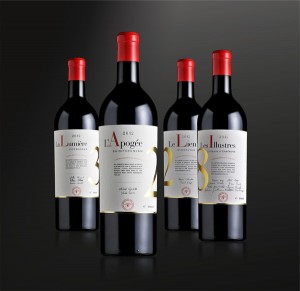
That is why it is important to preserve as much as possible, and why we planted some Piquepoul noir for instance (less than 100 hectares remaining in France).
In terms of consumption trends: rosé wines, bag in box and the e-market are growing strong.
What’s a ‘day in your life’ like? Could you give us an insight into the wine industry and what you do?
It depends on the period of the year, it is quite seasonal. It is also quite diverse since I have a dual role as a winemaker and brand ambassador.
At the moment, I spend my days driving from one winery to another, tasting the tanks to see the evolution and adapt the process, planning the harvest for the next days and checking at the weather forecast every 2 hours…
From November to February, a common day would start with a tasting of the new vintage with customers, go on with work in the lab, preparing new blends for bottling, and then brainstorm with the marketing team on a new back label or brochure text.
In spring comes the time of wine fairs such as Prowein and tasting events with customers or journalists in Europe, still keeping an eye on the wines being aged in barrels. And the cycle starts all over again, preparing in summer the new vintage to come…
What’s your greatest/most memorable professional moment been, so far?
I worked 1 year at a premium family estate of Northern Rhône Valley, Domaine Yves Cuilleron. Yves is a passionate winegrower that loves sharing with people as passionate as he is.
I will always remember a vertical tasting we did of Saint-Joseph white, Saint-Joseph red, Condrieu and Côte-Rôtie, between 1976 and 2006 (and only a few vintages were missing). It was really intense!
Where do you get your ideas?
First of all, making wine is a team work, so inside the technical staff, we are always sharing ideas. We also work with highly-experienced wine consultants that see other things in other places. It broadens our perspective. Finally, reading the press and listening to our customers or final consumers is a big source of inspiration.
What’s your philosophy, summed up in a sentence?
“It is not because things are difficult that we do not dare, it is because we do not dare that things are difficult.” – Sénèque [Ed: Seneca]
What’s the biggest challenge you’ve had, how did you overcome it, and what did you learn from it?
With this dual role at Les Vignobles Foncalieu, I think this is actually my biggest challenge. I learn everyday. Each vintage requires adaptation, with a new context, a different balance in the wines.
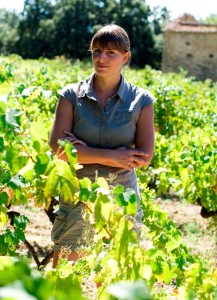
I also learn a lot from my contact with the customers, about specificities and preferences of each market.
Who’s the person who’s most inspired you in your work – food industry or otherwise? Is there anyone that you draw inspiration or strength from? Do you have any specific culinary influences?
I learned a lot when I worked in Côtes-du-Rhône, at Domaine Notre-Dame de Cousignac, in Ardèche (which belongs to the Pommier family). Raphaël Pommier and his father were very inspiring, from both the professional and human points of view.
Their enthusiasm, no matter how hard the work was, their respect for nature and history and their generosity were a real breath of fresh air.
What do you enjoy most and least about what you do?
What I enjoy most is the ‘multidisciplinarity’ of my work and the diversity of people of interest I get to meet (consultants, technicians, journalists, wine retailers, restaurant owners, other winegrowers…).
What I enjoy least would be the race against the clock this implies, without any off-peak period. But it’s a great challenge since it requires more organisation.
What advice would you give to aspiring wine professionals who’d want the kind of results that you’ve had?
Be open-minded and develop multiple skills.
If you weren’t doing what you do now, what would you be doing instead?
I’ve always been fond of flower shops. I love the smell of it and the domination of this green fresh colour. So I think that, if I hadn’t studied as many years as I did, I would have graduated as a florist.
I would have made floral compositions, using this specific flower or this other, a bit like what I do when I make a wine blend, using a palette of different tastes and textures.
What’s your ultimate aim and goal for your career and your time with Foncalieu? If you could achieve anything with it, what would you pick? Money and reality are no obstacle, so shoot for the moon…
I would like even more French and international recognition of the quality of our wines, because they really deserve it.
Where and what next for you?
Who knows? I have always remained open to opportunities. But I only started at Les Vignobles Foncalieu 2 vintages ago, so I don’t think too much of the next step for the moment! I simply focus on being better and better at what I do.
Anything I missed that you’d like to include here?
I just would like to point at that all the things we do at Les Vignobles Foncalieu, all the time spent by the team on making attractive wines, is just for one goal: ensuring a proper revenue to the 1000 growers the cooperative belongs to, so that they can pass their vineyards onto their children and preserve the beautiful landscapes in the South of France.
Just like the famous motto still etched onto our Maraussan winery, France’s first ever wine cooperative: “All for one, one for all”.
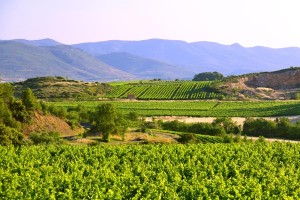
And we always ask three customary ridiculous questions…
I don’t know what to expect…
You have acquired a pet T-Rex and are morally obliged to look after it. It is 13 ft tall at the hips, eats half a ton of raw meat a day, and likes taking long walks. What would you call it and what would you do to keep it entertained and housed?
I would call it Denver and buy it a guitar to start a rock band… if you see the reference (though the original one was a Corythosaurus).
If Foncalieu was forced to change from a purveyor of delicious French wines into a martial arts dojo, what style would you guys teach and what music would you play in your gym to get people fired up?
We would teach Taekwondo (that I actually practiced when I was 18) and would play “Don’t phunk with my heart” from The Black Eyed Peas to get people fired up in the dojo because this song always gives me an irrepressible urge to move my body.
If you were given an infinite budget but had to spend it all on entirely frivolous stuff, what are the first 3 things you’d buy, and why?
Flowers (see above), shoes (you never have enough) and electronic devices (because you have to keep up with the times…)
